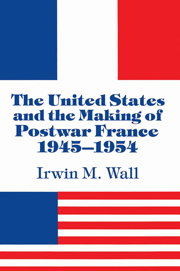Book contents
- Frontmatter
- Contents
- Acknowledgments
- List of abbreviations
- Introduction
- 1 The diplomatic heritage
- 2 The postwar years: Independence compromised
- 3 L'année terrible
- 4 Americanizing the French
- 5 Building an alliance
- 6 The Marshall Plan
- 7 Military aid and French independence
- 8 The United States and French Indochina
- 9 France declares its independence
- Conclusion
- Bibliography
- Index
9 - France declares its independence
Published online by Cambridge University Press: 04 December 2009
- Frontmatter
- Contents
- Acknowledgments
- List of abbreviations
- Introduction
- 1 The diplomatic heritage
- 2 The postwar years: Independence compromised
- 3 L'année terrible
- 4 Americanizing the French
- 5 Building an alliance
- 6 The Marshall Plan
- 7 Military aid and French independence
- 8 The United States and French Indochina
- 9 France declares its independence
- Conclusion
- Bibliography
- Index
Summary
THE EUROPEAN DEFENSE COMMUNITY
As It Stepped up Pressure on the French in Indochina, the United States increased its efforts to force the French to ratify the treaty establishing the European Defense Community. France was now the linchpin of American policy in Europe and Asia, and in both areas Washington's frustration grew in proportion to French inability or unwillingness to act. The governments of René Mayer and Joseph Laniel, which held power from January 1953 to June 1954, enjoyed American support and confidence, yet each refused to submit the EDC treaty for parliamentary ratification. Both had good reason. The conservative majority that governed France since the 1951 elections was divided over the treaty. If a majority in favor of ratification existed in the National Assembly, it would have to include the Socialists. Rather than seek the support of the left, Mayer and Laniel tried to obtain additional protocols to the treaty from France's five partners, and assurances from the United States and Britain, in an effort to make the EDC acceptable to conservative and Gaullist members of the coalition.
These efforts dragged on interminably through 1953 and 1954, as the Indochina war wound down to its inglorious end. In desperation the Americans multiplied their pressures to secure ratification before the Geneva conference, for lurking in the background was the increasingly powerful and threatening figure of Pierre Mendès France.
- Type
- Chapter
- Information
- The United States and the Making of Postwar France, 1945–1954 , pp. 263 - 296Publisher: Cambridge University PressPrint publication year: 1991
- 1
- Cited by

